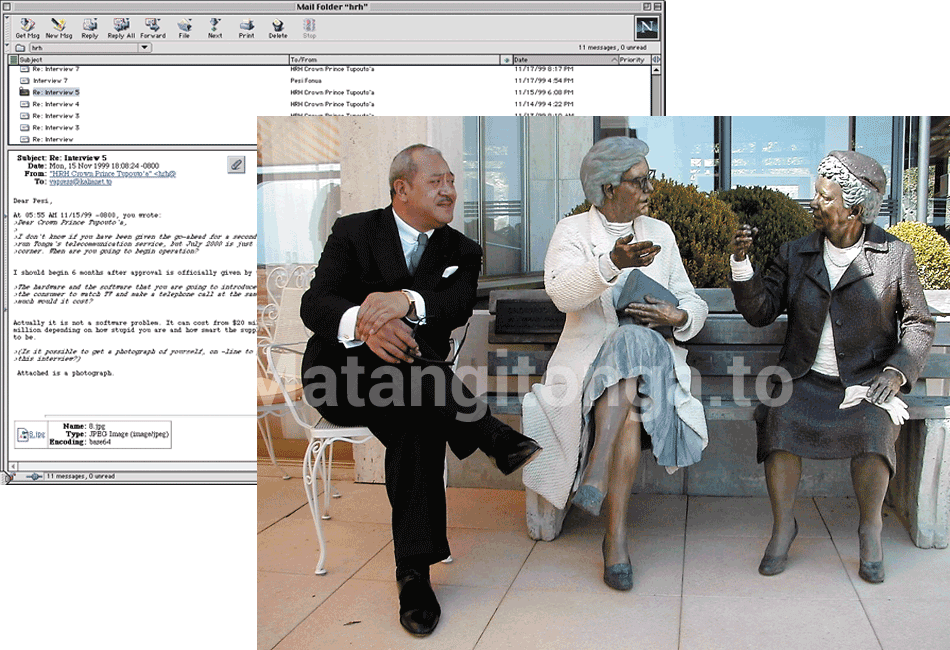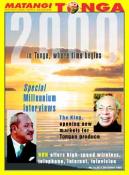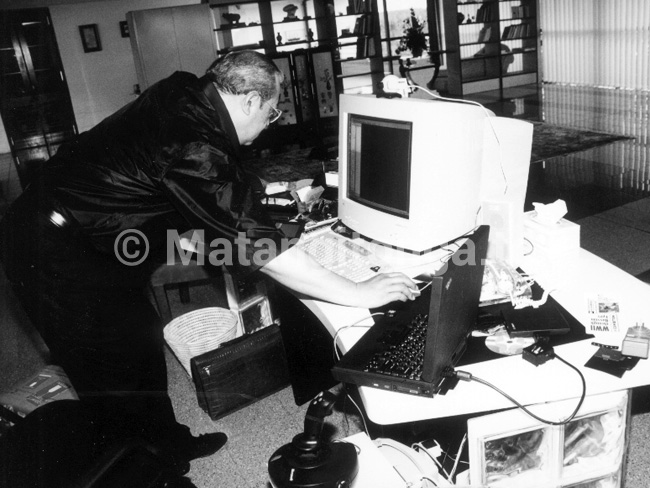


From Matangi Tonga Magazine Vol. 14, no. 4, December 1999.
By Pesi Fonua.
At the turn of the century, Tonga's Crown Prince Tupouto‘a (51), talks about his bid to provide a second telephone carrier for Tonga, alongside the new Communications Corporation planned by government. He also comments on the Privy Council decisions, made when he was Prince Regent, to dissolve the first Harbour Authority and to stop payment of pensions to working public servants.
Tupouto‘a was about to leave on an overseas trip when Matangi Tonga approached him for an interview about what the 21st century might have to offer with regards to the new technologies and economic opportunities in Tonga. The heir to the Tongan throne, who has a great personal interest in computer technology and in telecommunications, agreed saying, "no problem, but I am flying out to London tomorrow". This presented us with an opportunity to use the computers and telecommunications we were going to talk about. Through the email, service questions were asked one or two at a time and the Crown Prince answered from wherever he happened to be. The interview started in Hong Kong then moved on to Europe, where the photograph of the Crown Prince was taken in Switzerland and sent to Tonga by email.
Pesi Fonua: Tonga is in transition with regards to our telecommunications service. The franchise agreement with Cable and Wireless plc will come to an end next July. You said a few years ago that the most appropriate telecommunications operation for Tonga would be for one big company to operate both the domestic and the international service. Do you still think that this is the best approach—bearing in mind that the down side of the current set up is that there is no competition?
HRH Crown Prince Tupouto‘a: The technology has surpassed the Cable and Wireless Agreement, which is an absurdity. It is a monument to the limited knowledge and negotiating powers of the late ‘Akau‘ola, and in this sense, when Mark Anthony says in his eulogy for Julius Caesar that the evil that men do live on after them etc., he might care to have mentioned incompetence and stupidity as well. What truly worries me is, what precisely were the crowd of degree’d bureaucrats who constantly accompanied the late Hangman to London and Hong Kong (to attend the Hong Kong Sevens at the invitation of Cable and Wireless) doing when the extremely unequal terms of the Cable and Wireless agreement were so readily agreed to? They were the same ones who assured the Government that the agreement was sound.
Tonga’s telecommunications needs new investment in something other than the welfare of the Board members and Management.
There was a report called the Cutler Report whose recommendations, since accepted by the Government, included allowing Tonga Telecom to seek a technology partner, while at the same time the government should grant a license for a second carrier in order to provide competition. In my opinion, it is the lack of competition, which has caused the excessive behaviour within the Telecom Board while at the same time they seem to have lost interest in exploring new technologies. It is quite amazing that they should have 2,800 applications for telephones pending for the last two years and their latest expansion will provide them with the capacity to increase the number of telephones by 1,000.
The notion of issuing a licence to a second carrier? Will this connect Tonga to the outside world, as Cable and Wireless has been doing, or compete with the proposed new Tonga Communications Corporation? How do you think an efficient and a high-tech conscious service should be structured?
In short, the opposite of what is in place now. The trouble with C&W, is that their interest is in making Fiji the hub of telecommunications for the Pacific. This is natural because of the amount of investment they have made there. The internet services, for example, of Vanu‘atu and the Solomon Islands are routed through Suva with Fiji taking first priority and the others waiting in line. In order to punish Tonga for going its own way, C&W charge their 600 internet subscribers $15 an hour. Their costs of renting the already inadequate satellite bandwidth is around $10,000 a month. You work out the rip-off yourself and you will see that it is quite substantial. Added to that C&W get a double whammie because the exchange with which they connect Tonga to the internet in the USA is C&W, not the cheapest.
I should point out at this stage that I have applied for the second license and so my views on the inefficiency of the existing services should be seen in that light. Having said that, I would start with a structure which is designed to serve Tonga’s interests as opposed to subjugating them to those of C&W Fiji. But a second carrier will certainly shake both C&W and Telecom out of their lethargy.
The equipment C&W has in place seeks to transmit two different signals on the same dish, whereas the proper way to go is to use the same signal to carry three services—phone, internet and TV. This way, one can truly take advantage of the compressibility of internet protocol and double or quadruple up on speed for the same bandwidth and therefore cost. C&W’s signal can only be compressed 2 to 1 but internet protocol can be compressed 8 to 1.
If Cable and Wireless is trying to use Fiji as the hub for their telecommunications operation in this part of the world, is it possible for Tonga to work toward making Tonga as the hub for telecommunications in the region, bearing in mind that we have our own satellite company, TongaSat, and there are people like yourself who are deeply interested in the latest in telecommunications technology?
The only way to succeed in this is to be more competitive than C&W, and I do not think this is going to be difficult. The more difficult part is seeing whether our neighbours would allow us to do this.
One of the major stumbling blocks of doing business in Tonga, is the small market. If we are to have two telecommunications companies where do you think the competitive edge will be, in administration or in technology?
There should initially be two, but I do not intend that it should remain so. One shall necessarily have to die of natural causes!
Our email system was down again yesterday evening, but is back in operation this morning.
Such is life with C&W. Whenever you see an inferior service or over priced goods, it is a heaven-sent business opportunity.
We have heard of new high tech telecommunications systems, the latest I think is Iridium, what do you think is the most suitable for Tonga?
Iridium is a series of 64 birds flying on a low orbit north-south. At $6 plus a minute from anywhere to anywhere at barely high enough speeds to support fax but not e-mail it has been a gigantic flop. Teledesic, the joint venture between Microsoft and Boeing, could not raise the money and is frozen for the moment.
The most suitable for Tonga is a high-speed digital signal, wireless (so that there are no lines to be damaged by typhoons or excessive rain) which can carry telephony, internet access and television. Telecommunications in Tonga must get into the entertainment field if it is to provide a reasonable service at affordable prices. The customer should be able to buy a computer, plug it in, pull out an aerial and make a phone call. At the same time, he should be able to swipe a card on the computer, establish an account and switch to his favourite TV channel while he is talking on the phone.
The Royal School of Science is one of the projects that you initiated, and I think it has become a great success, considering that already the demand exceeds the capacity of the school. RSS has also become the centre for the development of the computer technology in Tonga. What is the future of the school?
Expansion. Success has come about precisely because it was kept out of the hands of the Ministry of Education. Its greatest success is in identifying those with a natural hacker mentality, for they will be the future of the computer-based industries in Tonga.
During the past few years the World Bank has been publicising the concept of an ‘intelligent island’, with Singapore as a model, where services are efficient and are provided at an alarming speed. For example, the unloading of cargo at the wharf and the clearing of goods by the Customs, which used to take a day, can now be completed in a few hours. Is it viable for Tonga to adopt such a concept and how long will it take for Tonga to catch up by computerising its government and people?
In short, never. Singapore has reached this stage having travelled a very rocky road from a British Colonial past, occupation by the Japanese Army, food shortages, post colonial struggle, getting kicked out of Malaysia, and risking everything on the throw of the dice and Lee Kuan Yew. Singapore brings together many races and unites them with a work ethic under a strictly managed existence. The only thing that Tongans have in common with Singaporeans is an inherent squatter mentality. Singapore has become a Nanny State by necessity, because if left to their own devices they would urinate in the elevators. Left to their own devices, Tongans would do the same; as it is, they see nothing wrong with allowing their pigs to run all over their townships leaving pig droppings everywhere. No one has yet made the connection between this and the failure of the tourism industry to attract the required number of tourists. The Ministry of Tourism appears to believe that the cure for low tourism figures is to increase the number of Tourism Conferences, which the officials should attend every year.
We have a very long way to go and many changes to make in Tonga’s national life before we can even approach comparing ourselves to Singapore. Just try getting Tongans to work in a factory from 9 to 5 every day without suddenly having to attend a funeral for a week.
The cure is there but it may be impossible to administer.
Singapore has a good location going for it and had a thriving entrepot trade even before the war. It should also be remembered that Singapore is the downtown financial district for the region but just happens to be politically separate. In the same way, New Zealand was part and parcel of the British agricultural sector but just geographically separated by two oceans from the Motherland. Singapore would typically, for example, attract a West German firm to invest in a company which then sub-contracts out to India for parts, which are assembled in Thailand and exported to the United States. Can you imagine the number of hurdles, bureaucratic absurdities, permissions and licenses which the Tongan Ministry for Labour Commerce and Industries as well as Treasury would place in the way of anyone trying to do that in Tonga? My German school friend did this in a day in Singapore. He could have taken half a day but he had to take his father to the airport!
To be fair to the naturally incompetent countries of the world (i.e. most of them), I do not believe that the World Bank knows very much about Singapore.
Your reference to the only thing that Tongans have in common with Singaporeans is an inherent squatter mentality. What is your interpretation of a squatter mentality?
Lack of consideration for the group. An insistence on exercising one’s “rights” even to the most ridiculous degree regardless of the overall harm it does to the rest of society. Examples are:
- vandalism;
- lack of respect for other people’s property (buildings, cars, anything left in the open);
- absence of pride when it comes to begging in the street;
- public drunkenness;
- Tongan borrowing (theft in other societies) from one’s relatives and friends;
- litter;
- squatting (viz Tukutonga rubbish dump).
All of the above are found in abundance in Tongan society where extraordinary troubles are taken to attend long boring church services to the exclusion, by law, of every other activity on Sundays.
I don’t know if you have been given the go-ahead for a second carrier to operate in Tonga, but July 2000 is just around the corner. When are you going to begin operation?
I should begin six months after approval is officially given by the Government.

The hardware and the software that you are going to introduce to enable the consumer to watch TV and make a telephone call at the same time. How much would it cost?
Actually it is not a software problem. It can cost from $20 million to $5 million depending on how stupid you are and how smart the supplier happens to be.
How do you think high tech in telecommunications can solve the world’s problem of over-population?
I disagree that the world is over-populated or even likely to be within our imagination. I believe that the food shortage is a crisis of price and not production.
When I last bought a computer in the United States, my crate arrived packed with popcorn. It was just as good as polystyrene but with the added advantage that it was fully disposable. I scattered it over the roof of the building while squadrons of birds descended to devour it. It was all gone in 30 minutes. At the same time, the United States subsidises farmers NOT to grow because any slight increase in production would cause commodity prices to collapse… and all this from a country whose agriculture already feeds a quarter of the globe.
The other side of the coin is that during the 1960’s, Ethiopia, under the old Emperor, fed half of Africa. The starvation in Eritrea was manufactured by the regime because of the province’s attempt to break away from the Central Government. In the same vein, I believe that the cause of much of the world’s famine comes from mismanagement, stupidity, corruption, and sheer bloody-mindedness. It has nothing to do with production.
On two separate occasions when you became Prince Regent, the Privy Council made firm decisions, which caused public debates. First was the dissolving of the members of the first Harbour Authority. More recently was Privy Council Decision No. 308, stopping the payment of pensions and gratuities to Government Ministers and public servants who have retired but are still working in government ministries, statutory bodies and government owned companies. What are the backgrounds for these Privy Council decisions?
The first act of the newly independent Harbours and Wharves Board was to seek advice on whether or not they had the power to overturn a decision which had previously been made by the Privy Council.
They were advised that this was so. They therefore immediately reimposed the taxes on oil destined for the generation of electrical power for the country—effectively raising the price of power. The Privy Council had previously given this relief for obvious reasons. While the Board claimed it was within its rights, they needed to be reminded that the same law, which gave them these powers, also provided for their dismissal on the grounds of misconduct. The worst misconduct a person can commit in Tonga is to flout the King’s authority—or at least to try. I did not accept their apologies because they were like burglars who were very apologetic when they were caught but were not at all apologetic when they were committing the offence.
As for the pension scandal, I think that the Boards in charge of Government-owned companies (or any other company for that matter) should be aware that they are expected to behave responsibly otherwise swift retribution shall follow. Inertia on the part of the Government in the past gave these Boards a false sense of security and the idea that they were somehow not answerable to anyone for their actions. However, it is interesting that in military law, irresponsible behaviour is more specifically categorised than in civilian law. Mutiny is when the lower orders rebel against higher authority. However, when those in authority wilfully behave in a highly irresponsible manner, it is termed a barratry. It is significant, furthermore, that both carry the death sentence. While I do not advocate the death sentence in this case, I do wish to point out the seriousness of harm that is caused by misconduct at high levels.



